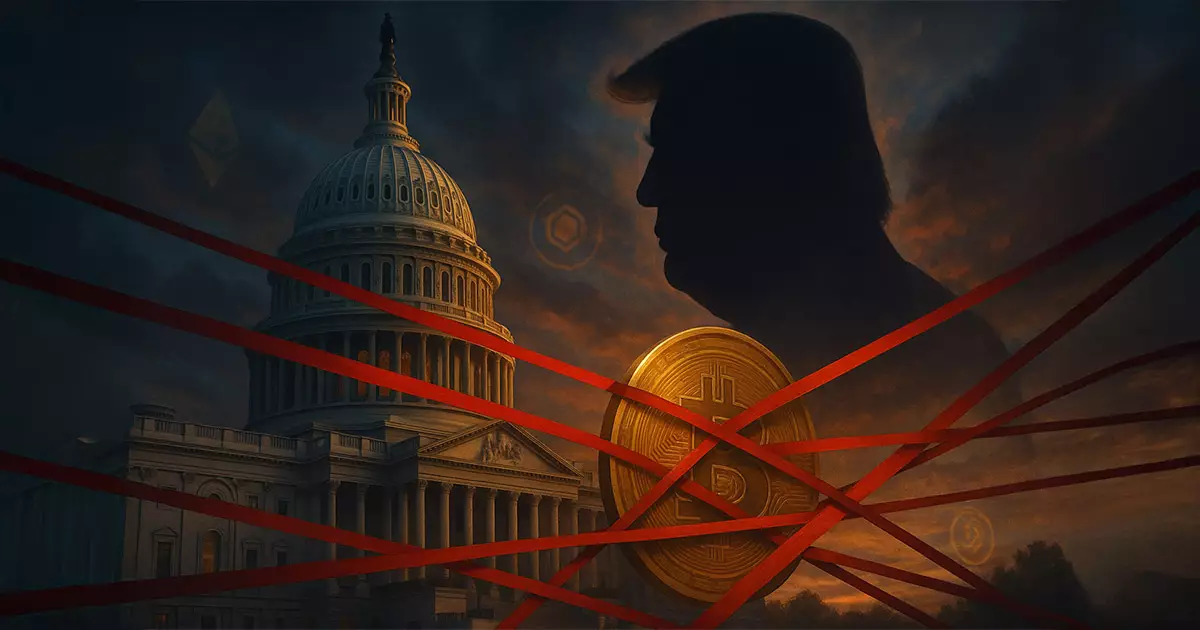The recent debates over the integrity of U.S. President Donald Trump’s forays into cryptocurrency have ignited a firestorm of scrutiny and controversy. With whispers of conflict of interest gaining momentum, lawmakers are finding it increasingly difficult to push forward major stablecoin legislation. The Guiding and Establishing National Innovation for U.S. Stablecoins (GENIUS) Act, aimed at establishing necessary regulatory frameworks, stands at the center of the storm. It’s disheartening to watch critical legislation stymied by allegations of personal gain wrapped in a flag of misgovernment.
Ryan Gilbert, the founder of Launchpad Capital, voiced his frustration, stating, “It’s unfortunate that personal business is getting in the way of good policy…” Such sentiments underscore a hypocrisy riddled within the corridors of power where personal aspirations overshadow governmental responsibilities.
The GENIUS Act: A Legislative Sinking Ship?
Perceived as a simple solution to regulate U.S. payment stablecoins, the GENIUS Act was envisioned as a step forward for a burgeoning digital economy. However, the bill’s fate took a disheartening turn when it failed to secure enough votes in the Senate, losing by a slim margin of 48-49. This reflects deeper trends in American politics where partisan agendas overshadow bipartisan solutions. Katrina Paglia, an influential voice in venture capitalism, echoed the disappointment, indicating that the act should have faced limited resistance thanks to its straightforward objectives.
The intertwining of cryptocurrency regulation with Trump’s personal financial ventures raises unsettling ethical questions. While setbacks in legislative progress can be expected, we cannot afford distractions when public welfare hangs in the balance. Lawmakers must resist succumbing to the dual-life of politics and profiteering.
Trump’s Crypto Empire: More Corrupt than Coin?
Trump’s ventures into cryptocurrency seem less about innovation and more about fostering an environment for personal enrichment. With his introduction of the $TRUMP memecoin, which peaked at an eye-watering $75, he struck gold until it turned to ash for many small investors who lost a staggering $2 billion as the price plummeted. Even more egregious is the after-the-fact realization that Trump-linked entities controlled 80% of the memecoin’s supply and cashed in around $100 million in trading fees. The disparity between his windfall and the losses suffered by investors is not merely a side note; it is an indictment of a system that permits such blatant conflicts of interest.
Yet the transactions don’t stop there. Reports of the Trump family’s potential stake acquisition in Binance, a company mired in legal troubles, raise alarm bells not only for their overt financial motives but also for the far-reaching implications this has on national financial security. The nexus of crypto assets and political power has never looked more concerning.
Political Fallout and Resurgent Backlash
The political backlash regarding Trump’s financial maneuvers is starting to gain serious momentum. Congressional inquiries are being propelled by ethical allegations that seem to entangle his administration in a web of corruption and influence peddling. With Senator Maxine Waters criticizing Trump’s significant profits, labeling them opportunistic and detrimental to the American public, the rhetoric is laced with urgency.
The result of this scrutiny? The inception of bills like the End Crypto Corruption Act from Senator Mark Kelly, aiming to obliterate any potential for congressional members to capitalize on digital assets. Kelly pointedly states that Trump is “cashing in on his presidency,” asserting that this is corruption laid bare for all to witness. Limited restraint from Congress is indicative of a troubling precedent: public office is becoming less about service and more about self-serving.
Negotiating the Expired Definitions of Integrity
Despite the evident challenges presented by these conflicts of interest, there is a burgeoning hope within bipartisan negotiations for the GENIUS Act to resurface. This bill, delayed by ethical suspicions, represents what should be a unifying effort for American digital finance; yet, the specter of suspicion looms heavily. Legislators face the harsh reality that reform cannot occur under the shadow of personal ambition.
The question remains: Will Congress have the moral fortitude to decouple itself from personal stakes in cryptocurrencies and focus instead on the legislative frameworks that can serve the country’s interest? The financial and ethical landscapes appear perilous, but the path forward hinges on whether lawmakers will prioritize public good over private gold. With the weight of history upon their shoulders, only time will tell if they can rise to this formidable challenge.



















Leave a Reply